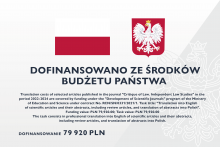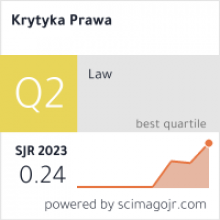Maciej Perkowski; Wojciech Zoń; Izabela Kraśnicka; Wioleta Hryniewicka-Filipkowska; Małgorzata Skórzewska-Amberg; Ewa M. Kwiatkowska; Katarzyna Staszyńska; Maciej Oksztulski
2025
17
( 1 )
DOI: 10.7206/kp.2080-1084.764
Abstrakt
This article analyses the impact of legal research on the education of future lawyers in Poland, focusing in particular on legal regulations and educational practices. The study aims to explain how the findings of research projects, especially of those funded by the National Science Centre (NSC)10, can be applied in teaching. The authors hypothesise that basic research has a minimal effect on legal education, which may result from the applicable legislation and internal conditions within university. The research involved an analysis of legal documents, a literature review, as well as surveys and interviews with academic staff. It examined the relationship between research and teaching activities in the context of higher education reform. The findings indicate that while most academics perceive their teaching and research as synergistic, there exist barriers in this areas – such as low motivation for research among students. The authors emphasise the need for reforms to better integrate research with teaching, which is crucial for enhancing the quality of legal education.
Maciej Perkowski; Izabela Kraśnicka; Anna Drabarz; Wojciech Zoń; Maciej Oksztulski; Małgorzata Skórzewska-Amberg; Ewa, M. Kwiatkowska
2023
15
( 2 )
DOI: 10.7206/kp.2080-1084.603
Abstrakt
The aim of the article is to provide an overview of the international and EU law framework concerning the relation between the research and teaching. The analysis of internal regulations of selected European states is provided for a broader vision and comparative perspective. Such an overview constitutes the initial ground for further research and evaluation of the applicable law and its implementation. The article constitutes a summary of the initial phase of the research project dedicated to the impact of the legal research on legal education based on the projects funded by the Polish National Science Centre.
Małgorzata Skórzewska-Amberg
2022
14
( 4 )
DOI: 10.7206/kp.2080-1084.553
Abstrakt
The review process of texts submitted for publication in scientific journals is one of the main ways of evaluating the scientific output of their authors. Any disruptions in this process can have serious and far-reaching consequences, not only in terms of the credibility and integrity of the author themselves, but – most importantly – in terms of the confidence in their achievements. Attempts to distort the review process have so far occurred most often in medical and exact sciences. The case of “The Critique of Law” discussed herein shows that attempts at scientific fraud affect also legal sciences. The purpose of the article is to inform the scientific community worldwide about subsequent attempts of unethical scholarly activities, to describe instances of malpractice, and to point out some of the possible ways to prevent the fraud in question.
Małgorzata Skórzewska-Amberg
2022
14
( 4 )
DOI: 10.7206/kp.2080-1084.552
Abstrakt
The review process of texts submitted for publication in scientific journals is one of the main ways of evaluating the scientific output of their authors. Any disruptions in this process can have serious and far-reaching consequences, not only in terms of the credibility and integrity of the author themselves, but – most importantly – in terms of the confidence in their achievements. Attempts to distort the review process have so far occurred most often in medical and exact sciences. The case of „The Critique of Law” discussed herein shows that attempts at scientific fraud affect also legal sciences. The purpose of the article is to inform the scientific community worldwide about subsequent attempts of unethical scholarly activities, to describe instances of malpractice, and to point out some of the possible ways to
Małgorzata Skórzewska-Amberg
2021
13
( 4 )
DOI: 10.7206/kp.2080-1084.493
Abstrakt
Protection of children against sexual exploitation, particularly against exploitation in cyberspace, constitutes one of the most burning issues of the modern world. The Internet is frequently used as the beginning of the road to sexually exploiting a child, and as way of earning the child’s trust and gaining physical access to them. Unfortunately, the COVID-19 pandemic and isolation resulting from it brought with them substantial threats, also in this area, whose effects will be long-term. What was observed during the pandemic was not only an increase in online traffic related to the distribution of child pornography, but also a definite increase in behaviours that may be classified as grooming. It is sometimes considered that grooming is the basic method leading to child sexual exploitation, or even its immanent feature. Relatedly, what becomes an important issue is an analysis of legal regulations that concern grooming in cyberspace, and an attempt to answer the question whether the scope and level of protection provided to children by Polish criminal law are sufficient.
Jan Henrik Amberg; Małgorzata Skórzewska-Amberg
2021
13
( 3 )
DOI: 10.7206/kp.2080-1084.477
Abstrakt
The COVID-19 pandemic, placing societies and governments in an exceptional situation in every respect, has had an impact on the legal order of individual countries. It pressed them, on the one hand, to take swift and decisive actions and, on the other hand – to a necessary thorough assessment and considering of the costs and consequences, both legal and economic, of the introduced measures, often related to the constraints of constitutionally guaranteed civil liberties. Although Sweden during the pandemic seemingly chose a path different from other European countries, keeping social life largely unaffected, in its essence this strategy did not differ much from those used in other countries. The aim of the article is to present the solutions adopted in Sweden and to analyse the Swedish strategy against the background of constitutional civil liberties.
Małgorzata Skórzewska-Amberg
2021
13
( 2 )
DOI: 10.7206/kp.2080-1084.445
Abstrakt
Małgorzata Skórzewska-Amberg
2021
13
( 2 )
DOI: 10.7206/kp.2080-1084.444
Abstrakt
Małgorzata Skórzewska-Amberg
2021
12
( 2 )
DOI: 10.7206/kp.2080-1084.445
Abstrakt
Małgorzata Skórzewska-Amberg
2021
12
( 2 )
DOI: 10.7206/kp.2080-1084.444
Abstrakt
Jolanta Jabłońska-Bonca; Małgorzata Skórzewska-Amberg
2014
6
( 1 )
DOI: 10.7206/kp.2080-1084.36
Abstrakt
Jolanta Jabłońska-Bonca; Małgorzata Skórzewska-Amberg
2015
7
( 1 )
DOI: 10.7206/kp.2080-1084.71
Abstrakt
Małgorzata Skórzewska-Amberg
2016
8
( 2 )
DOI: 10.7206/kp.2080-1084.113
Abstrakt
The aim of this paper is to address the issue of implementation of international legal instruments regarding cybercrime into the Polish criminal law. Effective protection against cybercrime requires, among other things, the establishment of an appropriate legal framework. Criminal prohibitions of a deterrent effect, which are a part of this framework, seem of particular importance. In Europe such a set of rules is provided for in the instruments of the Council of Europe as well as in the European Union instruments. As a member of both these international organisations, Poland is obliged to implement their standards. The author’s aim is to analyse whether and, if so, to what extent the current Polish criminal legislation is in line with European requirements. The process of implementation of these norms has expanded in the span of over 10 years and was initiated even before Poland accessed the European Union. Polish criminal law, however, is not yet fully compliant with international requirements on cybercrime. This paper is an attempt to identify some areas of the criminal law which are still to be amended as well as to submit some solutions de lege ferenda.
Małgorzata Skórzewska-Amberg
2018
10
( 3 )
DOI: 10.7206/kp.2080-1084.233
Abstrakt
In the times of global ICT networks, activities pursued online are not limited by space and time, and the content shared in cyberspace may reach a potentially unlimited audience. Even if access to this content requires some additional conditions to be fulfilled, it is usually not as problematic as to make this access more restricted. The ease of sharing and the illusory sense of complete anonymity online contributes to sharing multimedia materials also featuring content prohibited by law. A highly disturbing and, unfortunately, increasingly common phenomenon is the online sharing of images of people engaged in a sexual intercourse - with these images being shared without their knowledge and consent. Polish criminal law is aware of the significance of the problem, penalising behaviour involving recording and publishing images of nude persons engaged in sexual activity. It seems, however, that the category of punishable acts is too narrow, which shall be subject to criticism. The objective of the discussion presented herein is to make an attempt to analyse the scope of criminalisation regulated under Article 191a of the Criminal Code (hereinafter: the CC) and formulate a set of de lege ferenda demands.
Małgorzata Skórzewska-Amberg
2018
10
( 3 )
DOI: 10.7206/kp.2080-1084.232
Abstrakt
W dobie globalnych sieci teleinformatycznych działania podejmowane w cyber- przestrzeni nie są ograniczone przestrzenią i czasem, a udostępniane treści mogą docierać do potencjalnie nieograniczonego grona odbiorców. Nawet jeśli dostęp do nich uzależniony jest od wypełnienia dodatkowych warunków, to na ogół ich spełnienie nie jest na tyle kłopotliwe, aby taki dostęp utrudniało. Łatwość udostęp- niania oraz złudne poczucie całkowitej anonimowości wpływają na udostępnianie materiałów multimedialnych zawierających także treści prawem zakazane. Nie- zwykle niepokojącym, i niestety, coraz częstszym zjawiskiem jest udostępnianie w sieci zdjęć osób nagich bądź osób w trakcie czynności seksualnych - dokonywane bez ich wiedzy i zgody. Polskie prawo karne dostrzega wagę problemu, penalizując zachowania związane z utrwalaniem i upublicznianiem wizerunku osoby nagiej lub w trakcie czynności seksualnych, jednak wydaje się, że kategoria czynów karalnych ujęta jest zbyt wąsko, co należy ocenić krytycznie. Celem przedstawionych rozważań jest próba analizy zakresu kryminalizacji regulowanej w art. 191a k.k. oraz sformułowania postulatów de lege ferenda.







